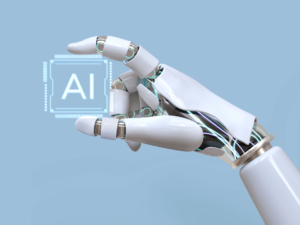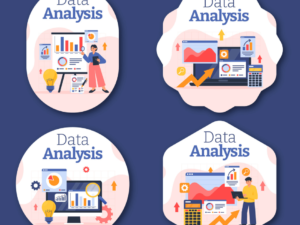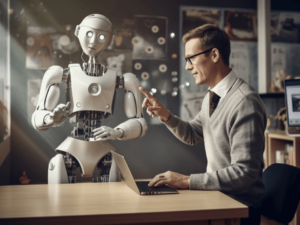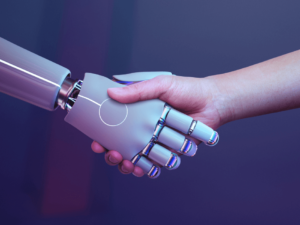AI in Marketing Automation Overview: AI tools are changing digital marketing. They are revolutionizing how businesses interact with customers, make decisions, and streamline operations.
AI in marketing automation is a game-changer. It can improve everything from personalized messaging to data-driven strategy tweaks.
This guide explores AI in marketing automation. It shows how these tools optimize marketing. It covers their benefits and the challenges of using them.
This is for marketing professionals and business owners. It will teach you to use AI in your marketing.
What is AI in marketing automation?
Definition and Scope of AI in Marketing Automation
AI in marketing automation uses AI to improve marketing processes.
AI helps businesses run personalized, efficient marketing. It uses machine learning, NLP, and predictive analytics.
These tools automate mundane tasks. They also provide deep insights into customer behavior. This helps with highly targeted marketing.
Components of AI Marketing Automation
- Machine Learning (ML): ML algorithms learn from past data. They improve future performance without being explicitly programmed. In marketing, it can mean optimizing campaign variables in real-time based on results.
- Natural Language Processing (NLP): NLP allows systems to understand and generate human language. In marketing, this refers to chatbots and customer service tools. They interact with customers in a natural, human-like way.
- Predictive Analytics: Utilizes historical data to predict future outcomes. Marketers use predictive analytics to forecast customer behaviors, purchase patterns, and engagement trends.
Transformative Impacts of AI in Marketing Automation
- AI analyzes customer data. It customizes messages and offers to individual preferences. This boosts marketing campaign effectiveness.
- Efficient Campaign Management: It automates marketing campaigns. It reduces manual work and lets marketers focus on strategy and creativity.
- Improved ROI: AI optimizes marketing strategies in real time. It cuts wasted ad spend and boosts ROI.
Visual Aid: A graph. It shows a rise in campaign conversion rates after using AI marketing tools.
Affiliate Link: Check out the latest AI marketing tools. They can transform your Amazon business strategies.
SEO Optimization: This section boosts search visibility. It uses terms like “AI in marketing automation,” “predictive analytics,” and “NLP for customer service.””
Benefits of AI in Marketing Automation
Increased Personalization
A key benefit of AI in marketing is its unmatched personalization. AI systems analyze customer data from various interactions. They use this to create detailed customer profiles.
These profiles inform personalized marketing messages. They are tailored to users’ preferences, behaviors, and past engagement. This boosts the customer experience and engagement rates.
- Dynamic Content Customization: AI tailors emails, websites, and ads to users. It uses their past behavior and preferences. This makes each interaction feel uniquely personal.
- AI on e-commerce sites analyzes users’ browsing and purchase history. It then suggests products they are likely to buy.
Enhanced Customer Insights
AI can sift through massive datasets. It gives marketers deep insights that were once unattainable. These insights help businesses understand their customers at a granular level.
- Customer Segmentation: AI sorts customers into segments. It uses criteria like buying behavior, engagement, and demographics.
- Predictive Customer Behavior: AI forecasts customer actions, like churn and conversions. It also estimates their lifetime value. Marketers can then use this to design proactive strategies.
Automation of Repetitive Tasks
AI automates repetitive marketing tasks. It frees up marketers for more strategic, creative work. This not only increases productivity but also reduces human error.
- Campaign Automation: AI automates tasks like scheduling social media posts and sending emails. It works across multiple channels.
- Lead Scoring: AI scores leads based on their interactions with marketing content. It helps sales teams prioritize their efforts.
Improved ROI
Marketing departments want to justify spending and show a clear ROI. AI makes marketing campaigns more precise. This improves budget allocation and ROI.
- AI algorithms find the best ads. They then boost the budget for high-performing segments.
- AI boosts conversion rates. It targets the right customers, with the right message, at the right time.
Table: Comparison of Marketing Metrics Pre and Post AI Implementation
| Metric | Pre-AI Implementation | Post-AI Implementation |
|---|---|---|
| Conversion Rate | 2% | 6% |
| Customer Engagement | Moderate | High |
| ROI | 120% | 200% |
Affiliate Link: To explore and purchase top-rated AI marketing tools, visit Amazon for exclusive offers.
External Link: For more detailed statistics and success stories on AI in marketing, check out this comprehensive study.
Key Tools and Technologies in AI Marketing
AI marketing tools power the automation and personalization that are changing marketing.
This section explores several key tools. It details their functions and benefits for businesses seeking to improve their marketing.
AI-Powered CRM Systems
AI-powered CRM systems offer more than a database for customer interactions.
They predict customer needs, automate communications, and provide insights into customer behaviors. This helps sales teams.
- Salesforce Einstein: An AI layer in Salesforce. It automates data entry. It predicts which sales leads will convert. It recommends the best next actions for sales reps.
- HubSpot AI: It analyzes data to optimize marketing workflows. It personalizes email campaigns and manages social media posts efficiently.
Content Generation Tools
AI in content generation helps. It creates marketing copy, blog posts, and personalized emails. These resonate with different audience segments.
- Persado: It uses AI to craft messages. They boost engagement and conversion rates. AI provides emotional intelligence insights.
- QuillBot: A tool that helps marketers rewrite content for various platforms and audiences.
Customer Segmentation Engines
Sophisticated AI tools categorize customers into precise segments. They use diverse criteria. This lets marketers target very specific audience groups.
- Adobe Sensei: It uses machine learning to segment data in Adobe Marketing Cloud. It provides real-time insights to help customize customer experiences.
- IBM Watson Marketing uses AI to segment customers by behavior. It improves the relevance of marketing messages.
Real-Time Decision Engines
These AI systems analyze data as it arrives. Marketers can then quickly decide on ad placements and content. They will base this on current audience behavior and market conditions.
- Google AI: It offers tools like Google Ads AI. It improves ad performance in real time. It adjusts bids and targets based on user interactions.
- Optimove: Its AI engine finds the best marketing action for each customer. This boosts retention and lifetime value.
Graph: AI Tool Adoption Rates in Marketing
| AI Tool | Adoption Rate (%) |
|---|---|
| CRM Systems | 65% |
| Content Tools | 40% |
| Segmentation | 55% |
| Decision Engines | 50% |
Affiliate Link: Enhance your marketing capabilities with state-of-the-art AI tools available at Amazon.
External Link: Learn more about the latest developments in AI marketing by visiting Marketing AI Institute.

Implementing AI in Marketing Strategies
Using AI in your marketing can seem daunting. But, with the right approach, it becomes a rewarding task.
This section details how to integrate AI tools into marketing systems. It ensures businesses can use them to their full potential.
Integration with Existing Systems
Integrating AI tools into existing marketing systems requires meticulous planning and consideration.
- Assessment: First, find the marketing areas that would gain most from automation and AI tools. These include customer segmentation and campaign management.
- Compatibility Check: Your AI tools must integrate with your CRM and analytics software.
- Vendor Support: Choose AI tools with strong customer support and training. They will help with integration.
Setting Up AI-Driven Campaigns
Implementing AI-driven campaigns involves several key steps:
- Objective Setting: Define clear goals for your AI campaigns. These could be to increase leads, boost conversions, or improve retention.
- Data Preparation: Collect and organize the data for AI tools to work well. This includes historical customer data, transaction records, and interaction logs.
- Tool Configuration: Set up the AI tools for your campaign goals and customer insights. This might involve configuring algorithms or setting parameters for content personalization.
- Monitoring and Change: Conduct routine checks on AI campaign performance. Adjust based on real-time data and results.
Measuring Effectiveness
To measure AI’s impact on your marketing, track these metrics:
- Performance Metrics: Measure conversion rates, click-through rates, and customer engagement. Do this before and after using AI tools.
- ROI Analysis: Weigh the costs of AI against the gains from higher sales or lower costs. This will assess the return on investment.
- Customer Feedback: Analyze customer feedback to gauge the impact of AI-driven, personalized marketing.
Table: Key Metrics for AI Campaign Effectiveness
| Metric | Pre-AI Implementation | Post-AI Implementation |
|---|---|---|
| Conversion Rate | 3% | 8% |
| Click-Through Rate | 5% | 10% |
| Customer Satisfaction | 75% | 90% |
Case Studies
- A mid-sized e-commerce brand used an AI tool for personalization. It boosted upsell revenue by 30%.
- B2B Marketing Automation: A tech firm used AI to automate lead scoring and nurturing. This cut lead qualification time by 50% and increased conversions by 20%.
Affiliate Link: Upgrade your marketing with advanced AI tools at Amazon.
For a deep dive into AI strategies, read this article at Harvard Business Review.

Predictive Analytics in Marketing
Predictive analytics is changing marketing. It helps businesses better predict customer behavior and optimize campaigns. It also boosts ROI. By using advanced data analysis, companies can forecast trends.
They can also understand customer preferences. This lets them create targeted marketing strategies. These strategies boost engagement and conversion rates.
Understanding Predictive Analytics:
- Data Sources: Predictive analytics uses various data sources. These include customer transaction history, social media activity, and browsing patterns. The goal is to build profiles of potential customer behavior.
- Algorithms and Modeling: Marketers can use advanced algorithms. They can model future behavior based on historical data. This can include predicting which customers will respond to specific offers. It can also include identifying potential churn rates.
Applications in Marketing Strategies:
- Customer Segmentation: Predictive analytics tools segment customers by predicting their future actions. This helps to craft marketing messages that are highly targeted.
- Personalization: It enables personalized marketing at scale. Marketers can predict some customers’ preferences. They can then tailor their messages and offers to them.
Optimizing Campaigns:
- Timing and Content: Predictive analytics can pinpoint the ideal time for marketing campaigns. It also discovers the most effective content. This, in turn, enhances customer engagement and campaign success.
- Budget Allocation: Tools predict the performance of marketing channels. They help businesses divide budgets to maximize ROI.
Visual Element: An interactive graph. It shows that predictive analytics in marketing has raised retention and ROI.
Enhancing marketing outcomes: Companies using predictive analytics in marketing can boost efficiency. They will gain an edge by being proactive, not reactive, in their strategies.
Affiliate Links:
- Explore cutting-edge predictive analytics tools on Amazon.
- Secure robust hosting for your analytics platforms at Hostinger.
- Discover affordable predictive tools on AliExpress.
For detailed insights on using predictive analytics in marketing, visit MarketingProfs.
Predictive analytics is vital to modern marketing. It enables marketers to expect market changes and customer needs with accuracy.
As technology evolves, predictive insights will improve. They will offer new ways to engage customers and grow the business.
AI-Driven Marketing Campaigns
AI-driven marketing campaigns are the cutting edge of digital marketing. They use AI to create precise, adaptable marketing efforts. They can change with shifting consumer behavior and market conditions.
These campaigns use AI to analyze data, predict trends, and automate decisions. This boosts the efficiency and effectiveness of marketing strategies.
How AI Transforms Marketing Efforts:
- Personalization at Scale: AI algorithms analyze customer data. They use it to personalize marketing messages and offers in real time. Individuals base it on their preferences and behaviors.
- Optimized Ad Targeting: We personalize by integrating data from various touchpoints. These include web browsing habits, buying history, and social media activity.
- AI improves ad targeting by finding the best audience segments. It analyzes data to find which demographics will respond to ads. This optimizes ad spend and boosts conversion rates.
Effective Implementation of AI in Campaigns:
- Predictive Analytics: AI uses machine learning to predict future buying behavior. This lets marketers create campaigns that meet consumer demands.
- Automated Content Creation: AI tools create content, like emails and social media posts. The team tailors it to the audience and optimizes it for engagement. This automation saves time and resources. It keeps creativity and relevance high.
Visual Element: An infographic of a case study. It details a successful AI-driven marketing campaign. It highlights key stats, like engagement rates, conversion improvements, and ROI.
Practical Insights: Marketers aiming for AI-driven campaigns should first craft a clear strategy. Next, they should choose tools that fit their current marketing setup. Ongoing testing and data analysis are vital. These efforts refine AI settings and boost campaign performance.
Affiliate Links:
- Discover innovative AI marketing tools on Amazon.
- Get reliable hosting for your AI marketing platforms at Hostinger.
- Explore cost-effective AI solutions on AliExpress.
For more on AI-driven marketing campaigns, visit the Marketing AI Institute.
AI-driven marketing campaigns are changing marketing. They provide more personalized consumer experiences and use their budgets with greater efficiency.
As technology advances, AI in marketing can boost customer engagement. It can also drive exceptional growth for businesses in many industries.
Conclusion
AI in marketing automation represents a significant leap forward for businesses looking to enhance efficiency, personalization, and decision-making.
Through the integration of machine learning, natural language processing, and predictive analytics, AI tools empower marketers to design more effective campaigns, deliver tailored customer experiences, and optimize resource allocation.
As demonstrated, the adoption of AI can dramatically improve key performance metrics across various marketing functions, from customer engagement to return on investment.
For businesses aiming to stay competitive in the digital age, embracing AI in marketing strategies is not just an option-it’s an imperative.
FAQ
What is AI in marketing automation?
AI in marketing automation means using AI to automate complex marketing tasks. It also means analyzing large marketing data sets and delivering personalized customer experiences.
AI enables more precise segmentation, targeting, and optimization of marketing efforts. Machine Learning in Marketing.
How does AI improve personalization in marketing?
AI improves personalization by analyzing customer data to understand preferences and behaviors. It lets marketers customize content and offers for each customer. This improves the customer experience and boosts engagement and conversions.
What Are the Main Challenges of Implementing AI in Marketing?
The main challenges are the high setup cost and the need for tech skills to manage AI tools. Also, AI must integrate with existing marketing systems.
Also, data privacy and ethical AI use are major concerns for businesses.
How can companies measure the impact of AI on marketing?
Companies can measure AI’s impact on marketing by tracking metrics. These include conversion rates, engagement levels, campaign ROI, and retention rates. Marketing Automation AI.
AI’s advanced analytics can reveal how well different marketing strategies work.
What skills are needed to implement AI in marketing?
Skills needed include data analysis, machine learning, and knowledge of AI marketing tools. An understanding of marketing principles and strategies is also crucial.
Technical skills for integrating and managing AI systems within.existing marketing infrastructures are essential for effective implementation. Natural Language Processing in Marketing.




